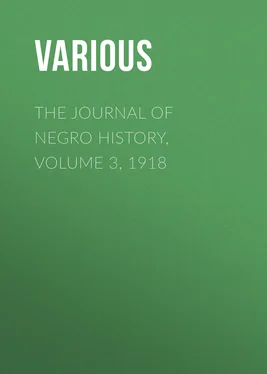Various - The Journal of Negro History, Volume 3, 1918
Здесь есть возможность читать онлайн «Various - The Journal of Negro History, Volume 3, 1918» — ознакомительный отрывок электронной книги совершенно бесплатно, а после прочтения отрывка купить полную версию. В некоторых случаях можно слушать аудио, скачать через торрент в формате fb2 и присутствует краткое содержание. Жанр: foreign_antique, periodic, История, foreign_edu, на английском языке. Описание произведения, (предисловие) а так же отзывы посетителей доступны на портале библиотеки ЛибКат.
- Название:The Journal of Negro History, Volume 3, 1918
- Автор:
- Жанр:
- Год:неизвестен
- ISBN:нет данных
- Рейтинг книги:5 / 5. Голосов: 1
-
Избранное:Добавить в избранное
- Отзывы:
-
Ваша оценка:
- 100
- 1
- 2
- 3
- 4
- 5
The Journal of Negro History, Volume 3, 1918: краткое содержание, описание и аннотация
Предлагаем к чтению аннотацию, описание, краткое содержание или предисловие (зависит от того, что написал сам автор книги «The Journal of Negro History, Volume 3, 1918»). Если вы не нашли необходимую информацию о книге — напишите в комментариях, мы постараемся отыскать её.
The Journal of Negro History, Volume 3, 1918 — читать онлайн ознакомительный отрывок
Ниже представлен текст книги, разбитый по страницам. Система сохранения места последней прочитанной страницы, позволяет с удобством читать онлайн бесплатно книгу «The Journal of Negro History, Volume 3, 1918», без необходимости каждый раз заново искать на чём Вы остановились. Поставьте закладку, и сможете в любой момент перейти на страницу, на которой закончили чтение.
Интервал:
Закладка:
Speaking afterwards of his work with this commission, Banneker referred to the unfailing kindness and courtesy of the distinguished company in which he found himself. One of his biographers says that the deportment of the mathematician during this engagement was such as to secure for him the respect and admiration of the commissioners. His striking superiority over all other men of his race whom they had met led them to disregard all prejudices of caste. 172During the stay of the commissioners at their official quarters, Banneker was invited, of course, to eat at the same table with them just as he sat with them during the conferences. This invitation, however, he declined, and provision was then, at his request, made for serving his meals at a separate table but in the same dining room and at the same hour as the others were served.
The reasons for Banneker's refusal to accept this invitation, however, are not so clear. Various of his biographers have attributed his action on this occasion to what they seemed pleased to term his "native modesty." Judging it at this distance from the time of its occurrence, it is perhaps difficult to understand fully his motive. But if we view it in the light of the consistent wisdom and high-mindedness that seemed to guide his whole life we can hope that his reasons for the self-imposed coventry on that occasion were sufficient unto himself, and that they fully excluded every element of servility.
Banneker's work with this commission was undertaken while he was still engaged in astronomical investigation, and after his services in Washington were concluded he returned to his home and resumed his work on his almanacs, which regularly appeared until 1802. He was now living alone in the home left him by his parents, and performed for himself nearly all the domestic services required for his health and comfort. Still obliged to rely mainly upon his farm for his livelihood, he tried various expedients with different tenants to rid himself of the necessity for giving so much of his time to the farm. In these efforts he was wholly unsuccessful. He finally decided, therefore, to enter into such an arrangement in the disposition of his effects as would provide him an annuity, relieving himself of all anxiety for his maintenance and at the same time affording him the leisure he wanted for study. This he was enabled to do through a contract with one of the Ellicotts, by the terms of which his friend was to take the title to Banneker's property, making the latter an annual allowance of 12 pounds for a given period of time calculated by Banneker to be the span of years he could reasonably be expected to live. Banneker was to continue to occupy and use the property during his life, after which the possession was to go to Ellicott. 173Banneker lived, however, eight years longer than he thought he would, but Ellicott faithfully lived up to this contract. This miscalculation is said to have been the only mistake in mathematics Banneker ever made. With his domestic affairs settled to his satisfaction, and having now the desired leisure to continue his studies, he gave himself up wholly to that object.
His active mind now found time also for occasional diversion to other lines than mathematics. It was about this time that he made the calculations showing that the locust plague was recurrent in cycles of 17 years each. He also wrote a dissertation on bees which has been favorably compared with a similar contribution by Pliny on the same subject written nearly 1800 years earlier. Banneker's nature seemed tuned also to the softer notes in the song of life. He loved music, and often, as a relaxation, he would sit beneath a huge chestnut tree near his house and beguile the hours by playing on his flute or violin. 174
The disastrous war waged in 1793 so disturbed Banneker that he devoted much time to the study of the best methods to promote peace. To this end he suggested that the United States Government establish a department in the President's cabinet to be in charge of a Secretary of Peace. He then made a strong appeal to the authorities of his government to take a broad stand based on humanity and justice and in that spirit to formulate a comprehensive plan by which A Lasting Peace 175might be substituted for the wars that were then disturbing the world.
During these years his home was frequently visited by people who sought him because of his intellectual gifts, and who were in no wise abashed by the fact of his racial connection. To them he was merely an honored citizen in the field of achievement. 176"During the whole of his long life," says Benjamin Ellicott, "he lived respectably and much esteemed by all who became acquainted with him, but more especially by those who could fully appreciate his genius and the extent of his acquirements. Although his mode of life was regular and extremely retired,—living alone, having never married, cooking his own victuals and washing his own clothes, and scarcely ever being absent from home,—yet there was nothing misanthropic in his character; for a gentleman who knew him thus speaks of him: 'I recollect him well. He was a brave-looking pleasant man, with something very noble in his appearance.' His mind was evidently much engrossed in his calculations; but he was glad to receive the visits which we often paid him."
Another writes: "When I was a boy I became very much interested in him, as his manners were those of a perfect gentleman: kind, generous, hospitable, humane, dignified, and pleasing, abounding in information on all the various subjects and incidents of the day, very modest and unassuming, and delighting in society at his own house. I have seen him frequently. His head was covered with a thick suit of white hair, which gave him a very dignified and venerable appearance. His dress was uniformly of superfine broadcloth, made in the old style of a plain coat, with straight collar and long waistcoat, and a broad-brimmed hat. His color was not jet-black, but decidedly negro. In size and personal appearance, the statue of Franklin at the Library of Philadelphia, as seen from the street, is a perfect likeness of him. Go to his house when you would, either by day or night, there was constantly standing in the middle of the floor a large table covered with books and papers. As he was an eminent mathematician, he was constantly in correspondence with other mathematicians in this country, with whom there was an interchange of questions of difficult solution." 177
Mrs. Tyson describes the courtliness of his manner when receiving friendly visits from the ladies of his community, who delighted to call on him in his neat cottage, to have the pleasure of his rare conversation. On these occasions he would sometimes allude to his love of the study of astronomy as quite unsuited to a man of his class. 178
In the earlier years of his life Banneker is said to have formed the "social drink" habit, which we can imagine was all the easier for a man of his agreeable manners, in an environment where hospitality was general, and in a day when cordiality usually expressed itself in that way. But to the credit of his strength of mind and will, it is also said that he actually overcame that habit by the mere determination that he would do it, and that on his return from his stay with the commission at Washington he is said to have declared rather proudly that he never partook once of the wines that were so freely offered him. 179
Banneker was not a professing Christian and not an adherent of any church, but "he loved the doctrines and mode of worship of the Society of Friends, and was frequently at their meetings." A contemporary says: "We have seen Banneker in Elkridge meeting house, where he always sat on the form nearest the door, his head uncovered. His ample forehead, white hair and reverent deportment gave him a very venerable appearance, as he leaned on the long staff (which he always carried with him) in quiet contemplation." 180
Читать дальшеИнтервал:
Закладка:
Похожие книги на «The Journal of Negro History, Volume 3, 1918»
Представляем Вашему вниманию похожие книги на «The Journal of Negro History, Volume 3, 1918» списком для выбора. Мы отобрали схожую по названию и смыслу литературу в надежде предоставить читателям больше вариантов отыскать новые, интересные, ещё непрочитанные произведения.
Обсуждение, отзывы о книге «The Journal of Negro History, Volume 3, 1918» и просто собственные мнения читателей. Оставьте ваши комментарии, напишите, что Вы думаете о произведении, его смысле или главных героях. Укажите что конкретно понравилось, а что нет, и почему Вы так считаете.












